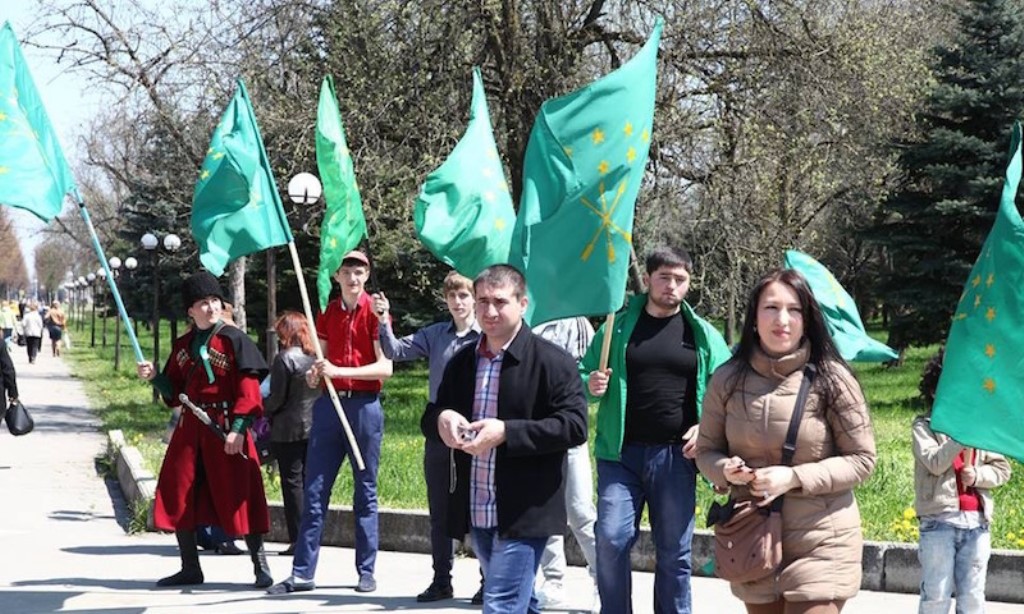

Three Circassian and Abaza organisations in the Russian Republic of Karachay–Cherkessia have appealed to President Vladimir Putin over what they say is a disproportionate allocation of power amongst the republic’s ethnic groups.
In an open letter dated 12 November, the Circassian and Abaza activists complained that power in Karachay–Cherkessia at all levels and in all branches of government was in the hands of ethnic Karachay people.
The groups asked Putin to send someone to Karachay–Cherkessia to deal with the ‘distortions in personnel policy’.
A petition launched on Monday calling for Karachay–Cherkessia to be split into two republics along ethnic lines or for Circassians and Abaza areas to be joined to neighbouring Stavropol Krai has so far garnered almost 5,000 signatures.
According to Russia’s 2018 census, Karachays (a Turkic people who speak the Karachay-Balkar language) make up 41% of the republic’s population, while 12% are Cherkess (Circassians), and 8% Abaza, an ethnic group closely related to Circassians. Ethnic Russians account for 32%.
Karachay leaders in the republic, according to the letter, hire mainly other Karachay people, leaving Circassians and Abaza pushed aside from official positions.
Abu-Yusuf Banov, one of the authors of the letter and leader of the Council of Elders of the Circassian People, told OC Media that the same situation can be seen in the media.
Journalist Murat Tlepshev, who is Circassian, told OC Media that public activists have repeatedly tried to build a dialogue with the authorities in Karachay–Cherkessia to eliminate discrimination, but failed to reach agreements.
This, he said, led them to appeal directly to the federal authorities.
‘Balanced representation’
According to Banov for some time there was a balanced representation of indigenous peoples in power structures in the republic after the ‘fraud’ of the 1999 election for the head of Karachay–Cherkessia led to ‘an inter-ethnic conflict almost breaking out’.
According to him, after the intervention of the federal authorities, a compromise was reached in which the position of head of Karachay–Cherkessia was ‘unofficially fixed’ to the Karachay people, the position of chair of the National Assembly (parliament) was ‘recognised as an [ethnic] Russian position’, and Chair of the Government was ‘supposed to be occupied by a Circassian’.
According to Banov, the agreement ‘soon started to be violated’, and in 2015 the topic of ‘discrimination based on nationality’ was again raised by public figures and leaders of the national movements of Circassians and Abaza, and the situation has now become aggravated again.
Dzhanibek Kuzhev, chair of the Abaza Interregional Public Organisation Adgylara told OC Media that the authorities are campaigning against Abaza Khazret Nirov, head of the Russian Federal Tax Service Administration for Karachay–Cherkessia. According to him, they are trying to remove him from this position in order to place a Karachay Rasul Tekeyev in his place.
‘Abaza traditionally occupied prominent positions in the power structures of Karachay–Cherkessia. But, apparently, the current republican government did not like this state of affairs’, Kuzhev said.
He suggested that in response to the current discontent of the Abaza and Circassian activists, the Karachay government might try to set the two peoples against each other.
Impoverishment and outflow of population
According to Banov, Circassians and Abazins are not only not represented in power structures, but are also deprived of the opportunity to fully support themselves and their families.
He said that non-Karakay farmers are denied subsidies, and areas where other indigenous peoples (Circassians, Abazins, and Nogays) live are poorer than those with majority Karachay populations.
Journalist Murat Tlepshev told OC Media that young Circassians and Abaza have become disillusioned with the difficulty in finding decent employment in Karachay–Cherkessia.
Campaign against Temrezov?
A source in the city administration of Cherkessk, the capital of Karachay–Cherkessia, told OC Media that he believed this latest move by Circassian and Abaza public figures is a continuation of a campaign against the head of the republic, Rashid Temrezov, which he claimed was launched six months ago.
According to him, the initiators of the campaign were Karachay public organisations that ‘said that in the issue of personnel Temrezov infringes upon the interests of Karachay’ and demanded Temrezov’s resignation ‘allegedly because he appointed Abaza Murat Ozov to the position of the head of his administration’.
He said Temrezov would likely be replaced in the near future with someone from another Karachay clan, and that the current discontent of the Circassians and the Abaza was being manipulated in order to attack Temrezov.






